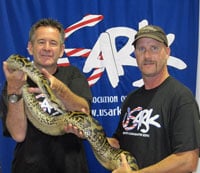Permitting continued captive-bred trade in Burmese pythons.
1. It is estimated that up to 100,000 Burmese pythons are currently held in captivity in the U.S. Most are captive-bred pythons that were bred and hatched in this country, some for as many as 10 generations. Burmese pythons are selectively bred for traits of docility and size, and unusual colors and patterns. Some Burmese pythons in breeding projects are valued at tens of thousands of dollars. As written, Senate Bill 373 makes no provisions for the disposition of any Burmese pythons currently in captivity.
2. As written, S. 373 would amount to a sweeping confiscation of the property rights of American citizens who keep Burmese pythons. No mention is made of suitable compensation for the millions of dollars of loss that will be incurred by the thousands of American small businesses that breed and sell pythons. If passed, S. 373 would make thousands of resident Burmese pythons worth nothing overnight. S. 373 would result in bankruptcies and foreclosures for many American breeders.
3. Reptile breeding businesses generate hundreds of millions of dollars annually. The sale of captive-bred pythons, including Burmese pythons, is a mainstay of the industry. Reptile breeding businesses are interlaced and interconnected with the American economy. Many small businesses exist that create caging, equipment and dry goods for pythons. Raising rodents to feed captive reptiles is a billion-dollar industry, and these businesses exist throughout the country. Nationwide tradde and reptile shows and other events are held 52 weeks a year.
4. The U.S. has a vibrant trade in reptiles and is responsible for 82 percent of this trade worldwide. Reptiles are provided to high-end collectors, zoos, research facilities, TV and film, as well as for export to Asia and Europe. The U.S. is the largest producer of captive-bred reptiles for export worldwide.
5. In the U.S., reptile keepers and breeders have founded and currently maintain viable captive populations of 35 species and subspecies of pythons, including Burmese pythons. This is timely, particularly in light of the recent acknowledgment and recognition from international conservation and zoological organizations of the critical value of viable ancillary captive populations of vertebrate animals. Worldwide there are new projects costing hundreds of millions of dollars to establish captive populations of rare felines, antelopes, non-human primates, and hundreds of species of amphibians. Although largely unheralded, the foundation of the python populations is one of the greatest international conservation accomplishments of the past 30 years, at no expense to governments or tax payers. S. 373 would destroy these captive populations of pythons.
6. Most importantly, the possession and maintenance of Burmese pythons is a local issue, not a national issue. Most states, counties and cities already regulate possession of specified exotic species that are of ‘concern’ in that particular geographical location. In many states (including Florida), the possession of Burmese pythons requires permitting, inspections, secure caging, escape prevention, and safety protocols – there are penalties for violations. The United States Association of Reptile Keepers (USARK) continually promotes state legislation to address professional standards and is currently developing internal accreditation protocols to certify its member handlers and breeders. Our most recent efforts resulted in model legislation being signed into law in North Carolina. Additionally, we expect legislation to be introduced in both South Carolina and Virginia in 2010.
7. The Lacey Act is the most inflexible of statutes. It allows for no commercial trade of any kind. With respect to the Burmese python there are already thousands of these animals in the U.S. These are the result of captive breeding that has occurred for more than thirty years. S. 373 must be modified to account for this existing commercial industry. Further import of these species is not a priority for USARK, as imported animals are generally low quality. However, ensuring trade in resident pythons among qualified commercial handlers and breeders must be safeguarded.
Andrew Wyatt is the President of the United States Association of Reptile Keepers (USARK) and has been an avid herp enthusiast for more than 35 years. He has traveled the world and has had his animals featured in a number of television productions. For more information about USARK,click here.



